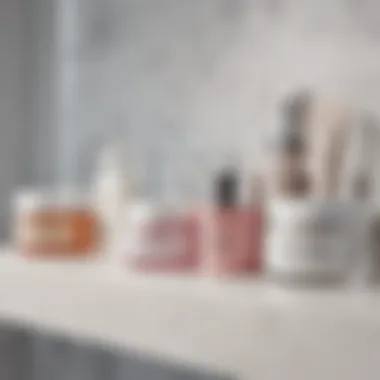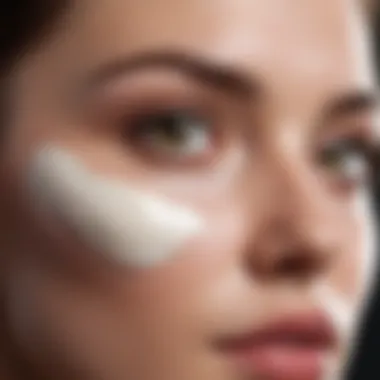Top Drugstore Retinol Creams: Affordable Skincare Solutions


Intro
When it comes to skincare, the gold standard for many is retinol, a potent derivative of vitamin A. This small but mighty compound has gained quite a reputation for its ability to tackle a slew of skin issues, from fine lines and wrinkles to uneven texture and dullness. Why is retinol such a buzzword in beauty circles? The answer lies in its ability to stimulate collagen production and accelerate cell turnover, resulting in fresher and more youthful skin.
In today’s fast-paced world, the convenience of drugstore products makes finding effective solutions easier than ever. Women of all ages are turning to these accessible options to enhance their skincare regimens without breaking the bank. This article aims to dissect the top retinol creams available at drugstores, offering well-rounded reviews and insights that not only highlight their efficacy but also address their affordability.
Before diving into specific products, it is crucial to acknowledge that while retinol can be a fantastic ally, it is not a one-size-fits-all approach. The individual skin type plays a significant role in how the skin reacts to retinol, thus adopting the right routine becomes essential. We will navigate through different considerations, explore product recommendations, and discuss why integrating retinol into your routine can be a game changer.
Retinol usage can bring a refreshing glow but can also have side effects. It’s always wise to proceed with caution and consult a skin expert if unsure.
Let’s embark on this journey of discovering the best retinol creams from drugstores, evaluating them based on key criteria, and gathering thoughtful tips on how to use them safely and effectively.
Understanding Retinol in Skincare
In the realm of skincare, retinol stands as a cornerstone ingredient often sought for its remarkable efficacy. Understanding retinol goes beyond the basics of skincare; it delves into a multifaceted ingredient that not only enhances beauty but also promotes skin health. For many, incorporating retinol into their routine is a breakthrough moment, opening doors to improved skin tone, texture, and radiance.
What is Retinol?
Retinol is a derivative of vitamin A, revered for its potent ability to renew and rejuvenate the skin. Unlike some skincare products that merely mask issues, retinol penetrates deeply, facilitating skin cell turnover and prompting the production of new, healthy skin cells. This makes it a preferred choice for those looking to tackle signs of aging, such as fine lines, wrinkles, and a lackluster appearance. On a more technical note, retinol is converted into retinoic acid once applied, which is the active form that actually signals skin cells to alter their behavior.
Many people might think of retinol as just another fancy skincare buzzword, but it's worth noting that the effects can be transformative when used correctly. From anti-aging to clearing up acne, this ingredient has a versatility that is rare in the beauty world. For those grappling with uneven skin tone or dark spots, retinol can assist in lightening those areas, making it an invaluable tool in any regimen.
How Retinol Works on the Skin
The magic of retinol lies in its ability to expedite the skin's natural renewal process. By accelerating cell turnover, retinol encourages the shedding of dead skin cells, revealing a fresher layer underneath. This process is crucial for minimizing the appearance of fine lines and preventing clogged pores, which are leading causes of acne.
It's not just the surface that benefits; deeper skin layers also experience positive changes. Retinol stimulates the production of collagen, a protein crucial for maintaining skin's elasticity and firmness. With increased collagen production, the skin becomes plumper and more resilient over time. However, it's crucial to note that while the results can be astounding, retinol's potency means it can also cause temporary irritation, particularly when first introduced into a skincare routine.
The Benefits of Using Retinol
The benefits of retinol are extensive, which is why it has earned a reputable status in both professional and consumer circles. Here are some noteworthy advantages:
- Reduces Signs of Aging: Regular use of retinol can visibly diminish fine lines and wrinkles, imparting a youthful glow.
- Improves Skin Texture: Users often report smoother skin due to the exfoliation properties of retinol, which can smooth rough patches and enhance overall skin feel.
- Fades Hyperpigmentation: Dark spots from sun damage or breakouts can be lessened, offering a more even skin tone.
- Treats Acne: By preventing clogged pores and reducing oil production, retinol can make a significant difference for those prone to acne.
- Boosts Collagen Production: This leads to firmer, more supple skin, thus providing structural support.
In essence, for those aiming to refine their skin’s appearance, retinol serves as a powerhouse ingredient that yields impressive results when used mindfully.
Like any potent ingredient, understanding how to use retinol effectively is key to enjoying its benefits while avoiding potential drawbacks. As this article unfolds, we will further explore the criteria for selecting the right retinol cream to suit individual needs, ensuring you make an informed choice as you embark on your skincare journey.
Criteria for Selecting Retinol Creams
Selecting the right retinol cream might feel like searching for a needle in a haystack. With so many options available in drugstores, understanding the criteria for choosing an effective retinol product is crucial. It’s not just about picking something off the shelf; it involves digging into formulations and recognizing how these creams can cater to your unique skin needs. Here, we'll break down the essentials that anyone looking for retinol should consider, helping you make an informed choice that hits the mark.
Concentration and Formulation
When it comes to retinol, concentration matters. Often found in percentages ranging from 0.25% to 1%, the concentration dictates how potent the cream will be. Beginners usually fare better with lower concentrations to allow the skin to adjust gradually. It’s like easing into a cold swimming pool rather than jumping in all at once. Higher concentrations are fabulous for seasoned users with well-adapted skin, but they can ignite irritation if you aren’t careful.
The formulation of the cream plays a pivotal role as well. Some formulations incorporate additional soothing agents, such as hyaluronic acid or niacinamide, to counteract retinol's tendency to cause dryness and irritation. Knowing the vehicle—whether it’s a cream, gel, or serum—can also inform your decision. For instance, creams may be better suited for dry skin types, while gels may appeal to those with oily skin.
Skin Type Considerations
Every face is its own unique canvas. Selecting a retinol cream should always involve considering your skin type. For instance, if you have sensitive skin, you might want to look for products specifically designed for your needs—these typically have lower concentrations and additional calming ingredients. On the flip side, individuals with oilier complexions may benefit from more lightweight formulations that won't clog pores.
Furthermore, combination skin can be a tricky one to navigate, as certain areas may react differently to retinol. It's wise to test any new product on a small patch of your skin to gauge any unusual reactions before committing fully. Make sure you’re square with your skin's quirks so that your choice of retinol brings out the best results without unwanted flare-ups.
Product Ingredients to Look For


Ingredients can make or break the effectiveness of a retinol cream. Beyond just the concentration of retinol, it’s essential to inspect the ingredient list for other beneficial components. Look for:
- Peptides: Help in collagen production, aiding in skin repair.
- Antioxidants: Such as vitamin C to combat oxidative stress.
- Soothing agents: Like aloe vera or chamomile that can alleviate irritation.
Stay mindful of fragrances and alcohol-based ingredients, which can exacerbate sensitivity or dryness. A clean ingredient list often means a kinder product for your skin. The less extraneous stuff—like fillers—the better the cream will typically work in harmony with your skin’s needs.
Remember: Knowledge and awareness about ingredients can sharpen your choices, ensuring they align with your skin’s specific requirements.
Choosing a retinol cream isn't just a task; it’s a decision that influences your skincare routine significantly. By focusing on concentration, considering skin type, and scrutinizing ingredients, you empower yourself to make choices that genuinely enhance your skin health.
Top Drugstore Retinol Creams Reviewed
Understanding the realm of retinol creams at drugstores is crucial for anyone looking to elevate their skincare game without breaking the bank. With countless options crowding the shelves, knowing which products deliver on their promises can save both time and money. The value of exploring these creams lies not only in their affordability, but also in their effectiveness, providing high-quality solutions that rival even some of the pricier alternatives found in specialty stores.
Affordable Options with High Impact
Product A: Features and Efficacy
When considering affordable retinol creams, CeraVe Skin Renewing Retinol Serum stands out. This product combines the power of retinol with ceramides and hyaluronic acid, making it a hydrating option for everyday use. Its lightweight texture absorbs quickly, allowing for easy layering with other products in your routine. Users rave about its ability to reduce fine lines and even skin tone, showcasing its efficacy without harsh side effects. The unique blend of ingredients indeed positions CeraVe as a go-to for many skincare enthusiasts and makes it a wise choice for those diving into the world of retinol.
Product B: User Reviews and Feedback
Neutrogena Rapid Wrinkle Repair has garnered attention in the skincare community, particularly for its user-friendly formula. The reviews often highlight how quickly results can be seen, with many users reporting visibly smoother skin within just a few weeks. Key to its popularity is the inclusion of accelerated retinol SA, which is reputed to penetrate deeper into the skin. However, some users do note that it may cause slight irritation initially; balancing usage is essential to harness its benefits without discomfort. Overall, the feedback reflects a strong consensus on its effectiveness, contributing to its cult status among drugstore retinol products.
Product C: Unique Selling Points
L'Oréal Paris Revitalift Anti-Aging Cream leans into a unique marketing angle by emphasizing not just anti-aging properties, but also skin renewal. Its impressive formulation includes pro-retinol and a blend of peptides to foster collagen production. This cream boasts a more luxurious feel compared to other options in its price range, making it an attractive choice for those seeking a luxury experience without a lavish budget. Users appreciate its rich texture that nourishes the skin while still delivering powerful retinol benefits. However, it’s worth noting that its thicker consistency may not be suitable for those with oily skin types.
Popular Choices Among Skincare Enthusiasts
Product D: Ingredients Breakdown
For those who scrutinize ingredients lists, Olay Regenerist Retinol 24 provides transparency and quality. The formulation is touted for its inclusion of niacinamide alongside retinol, making it a standout for brightening the skin while addressing signs of aging. Many users highlight its non-greasy feel, making it suitable for day and night use. This cream adeptly caters to a wide range of skin types and concerns, which solidifies its place as a beneficial contender in many routines.
Product E: Comparison with Competitors
When placed next to RoC Retinol Correxion Deep Wrinkle Night Cream, Olay holds its ground. Both creams prioritize efficacy, but RoC has a stronger reputation for focusing solely on retinol-based solutions. Users often weigh the differences, noting that while Olay offers dual benefits, RoC targets deeper wrinkles more aggressively. That said, RoC's potential for heightened irritation through potent retinol means Olay often gets the nod for a gentler, balanced approach.
Product F: Best Use Cases
As for specific use cases, Eucerin Q10 Anti-Wrinkle Face Cream deserves mention, especially for individuals with sensitive skin. This cream utilizes coenzyme Q10, complementing its retinol component to fight wrinkles effectively. It’s often recommended for mature skin, and users express satisfaction with its ability to plump and smooth the skin over time. However, it may not deliver immediate results as intensely as other products, which could dissuade those looking for instant gratification.
Luxury Feel on a Budget
Product G: Textural Experience
Aveeno Positively Radiant MaxGlow Serum also incorporates retinol alongside natural ingredients, creating a textural dream that feels silk-like upon application. This product's standout quality is how it feels on the skin, making it a popular option for those prioritizing sensory experiences in their routine. Its absorption leaves skin feeling nourished rather than sticky, although some users prefer a thicker cream.
Product H: Packaging and Presentation
In terms of aesthetics, La Roche-Posay Redermic R shines with its sophisticated packaging. The airless pump ensures that users get the full potency of retinol without contamination. This thoughtful design appeals to many who appreciate a bit of luxury in their skincare. While effective, its higher price point compared to other drugstore options may lead potential buyers to weigh the benefits of aesthetics against budget.
Product I: Long-Term Results
Finally, Vichy LiftActiv Retinol HA Night Serum is noted for delivering impressive long-term results. Users have expressed satisfaction with how it maintains skin's firmness and tackles the slow onset of aging signs. While it might take several weeks to see pronounced changes, those who stick with it often rave about its lasting impact. That sense of commitment can be advantageous for individuals rooting for skin that radiates health and vitality over time.


Incorporating Retinol into Your Skincare Routine
Integrating retinol into your skincare regimen is more than just a fashionable trend; it’s a step that can lead to remarkable improvements in skin health. Known for its effectiveness, retinol operates on a cellular level to promote skin renewal and combat signs of aging. However, given its potency, a well-structured approach to incorporating it into routines is crucial.
Starting Slowly: A Step-by-Step Approach
When it comes to retinol, less is often more, especially at the beginning. Starting slowly helps your skin adapt without overwhelming it.
- Initial Introduction: Begin by using retinol once or twice a week. This allows the skin to build tolerance. If you mix it up with other new products, it may muddy the waters when gauging your skin’s reactions.
- Increase Gradually: After several weeks, if your skin handles that initial dose well, you may increase usage to every other night or even nightly, depending on personal skin tolerance. If irritation arises, revert to less frequent applications.
- Moisturizer Strategy: Consider applying a gentle moisturizer before or after the retinol to further buffer its effects, allowing for a more comfortable experience.
Combining Retinol with Other Ingredients
Understanding how to mix retinol with other skincare ingredients is key to maximizing its benefits.
- Hyaluronic Acid: This ingredient is a hydration powerhouse and works well alongside retinol. It mitigates dryness and helps keep the skin plump, making it easier to tolerate retinol.
- Vitamin C: While both ingredients are potent, using them together can be tricky. If you choose to blend them, applying vitamin C in the morning and retinol at night can provide optimal results.
- Avoid Direct Mixing: It’s generally advisable to avoid layering retinol with exfoliating acids, like AHAs and BHAs, at the same time. This combination can lead to excessive peeling and sensitivity, making your skin cry for mercy.
Frequency of Use and Skin Adaptation
As skin becomes more accustomed to retinol, regular use transforms from daunting to a beneficial habit.
- Listen to Your Skin: If redness or peeling occurs, dial down the frequency. It’s about finding the sweet spot that suits your skin type. Not everything works the same way for everyone. An owner’s manual for your skin is attending to its cues.
- Sustain a Routine: After establishing a comfortable routine, aim for consistency. Many users see significant changes after a few months of regular use. The results — brighter, smoother skin — can be truly rewarding.
"Incorporating retinol into your regimen isn’t just about following trends; it’s about making informed choices for healthier skin."
Navigating the landscape of retinol can seem overwhelming at first glance. Yet, with a step-by-step approach, the right combinations, and attentive adaptation, you'll find it can become a powerful asset in your skincare journey.
Potential Side Effects of Retinol
When integrating retinol into a skincare routine, it’s vital to be informed about its potential side effects. While retinol is celebrated for its many benefits—like improving skin texture and reducing fine lines—users might face some challenges along the way. Understanding these side effects can help you navigate the experience more effectively and ensure that you reap the rewards of this powerful ingredient without unnecessary discomfort.
Common Reactions and How to Handle Them
Upon starting retinol, one might notice reactions like redness, dryness, or peeling. These are quite common, especially for those new to retinol. Skin sensitivity can also heighten; this is partly because retinol increases skin cell turnover. Here are a few ways to handle these reactions:
- Moisturize: Pair your retinol with a good moisturizer to combat dryness.
- Start Slow: Use retinol every other night or even less frequently at first, gradually increasing usage as your skin acclimates.
- Avoid Harsh Products: During this adjustment phase, steer clear of abrasive scrubs or strong acids.
"Skin undergoes a transition when introducing retinol, and patience is key as your skin adjusts."
By actively managing these side effects, you can reduce the likelihood of discomfort, making your skincare journey smoother.
When to Consult a Dermatologist
It’s prudent to reach out to a skincare professional if you experience any severe reactions. If redness doesn’t subside, or if your skin continues to peel excessively after a few weeks, consulting a dermatologist is a wise move. They can assess whether your skin is reacting normally or if you need to adjust your routine. Instances where you should consider a consultation include:
- Severe Irritation: If you notice blistering or open wounds, it's essential to seek expert advice.
- Persistent Breakouts: An increase in breakouts that doesn't settle may indicate an improper formulation for your skin type.
- Doubts About Usage: If you're unsure about how to incorporate retinol safely into your regimen.
Myths vs. Facts
Many myths circulate regarding retinol that can confuse users. It's crucial to separate fact from fiction to ensure effective and safe use:
- Myth: All skin types can use the same retinol concentration.
- Myth: Retinol is only for aging skin.
- Myth: You can’t use retinol during the day.
- Fact: Skin type determines the appropriate strength. Oily skin may tolerate stronger formulations than sensitive skin.
- Fact: Retinol benefits a variety of skin concerns, including acne and uneven skin tone, regardless of age.


- Fact: While it’s typically used at night due to sun sensitivity, lower concentrations can be safe for daytime under moisturizers with SPF.
Navigating the realm of retinol can seem daunting due to these myths, but with sound information, users can embrace the full potential of this skincare superstar.
Expert Recommendations
When it comes to selecting retinol creams from drugstores, relying on expert recommendations can make a world of difference. Whether it’s dermatologists who’ve spent years studying skin or skincare influencers who test products in real life, such insights are invaluable. These professionals offer guidance based on rigorous standards, personal experience, and real-world use, which is often more helpful than generic marketing claims.
Dermatologist Insights on Retinol Use
Dermatologists emphasize the importance of tailoring retinol creams to individual skin types. They recommend starting with a lower concentration and gradually increasing it. For example, someone with sensitive skin might benefit from a retinol cream that contains only 0.25% retinol, allowing the skin to adjust without irritation.
- Common Recommendations:
- Gradual Introduction: Slowly integrating retinol into your regimen is vital to prevent unwanted side effects.
- Day and Night Use: While some argue for nighttime application ONLY, dermatologists point out that it's essential to wear sunscreen during the day regardless of when you apply retinol, as its use can make skin more sensitive to UV rays.
"Start small and listen to your skin. If you experience irritation, give your skin a break but don’t give up entirely." – Dr. Aline K.
Such qualified insights assist in viewing retinol not as a one-size-fits-all product but as a component of a broader skincare strategy.
Skincare Influencers' Favorites
Turning to skincare influencers can also provide insight into which retinol creams are gaining traction among everyday users. These individuals often share firsthand experiences in a relatable way that experts might miss.
- Popular Picks:
- Some influencers rave about Neutrogena Rapid Wrinkle Repair for its easy availability and effectiveness in reducing fine lines.
- Meanwhile, others promote Olay Regenerist Retinol 24, appreciating its hydrating properties combined with retinol's anti-aging effects.
By following their suggestions, readers can sift through options based on wearability and results as perceived by actual users rather than just clinical terminology.
Consumer Feedback and Experiences
Lastly, consumer opinions provide a grassroots viewpoint that’s equally crucial. Websites like Reddit and beauty forums light up with discussions about personal experiences with various retinol products.
- Positive Experiences: People often remark on how certain creams visibly improved their skin over time.
- Common Complaints: Some report dryness or peeling, highlighting the need for a solid moisturizer to accompany retinol use.
By tapping into these shared experiences, potential users can gain insight into what to expect and how to manage side effects effectively. Listening to mixed reviews can prepare one for both the highs and the lows of using retinol.
In summary, whether it’s through dermatologist insights, influencer favorites, or consumer feedback, expert recommendations are key in navigating the sea of retinol options available at drugstores. They provide balanced perspectives that can empower women of all ages to make informed choices tailored to their unique skincare needs.
Final Thoughts on Retinol Creams from Drugstores
The journey through the myriad of retinol creams available at drugstores reveals the significant role retinol plays in skincare. This story isn't merely about finding an effective product; it's about understanding what retinol can offer and how to leverage it for your skin's needs. As we wrap up our discussion, it’s essential to emphasize a few key points and encourage you to make informed choices.
One cannot underestimate the importance of incorporating retinol into your skincare routine. It’s a powerful ingredient known for its ability to reduce fine lines, even out skin tone, and promote a youthful appearance. However, this isn’t a one-size-fits-all solution.
Summarizing Key Takeaways
- Retinol's Potency: Retinol is derived from vitamin A and works by speeding up skin cell turnover. For many, it's the cornerstone of an anti-aging regimen.
- Formulation Matters: The concentration of retinol in creams can vary greatly. Knowing whether a product suits your skin type is essential for both effectiveness and minimizing side effects.
- Start Slow: Introducing retinol gradually is crucial. Sticking to a schedule allows your skin to adapt, reducing the likelihood of irritation.
- Do Your Research: Not all products are created equal. The ingredients list can be filled with unnecessary additives or irritants that may do more harm than good.
- Expert Input: Recommendations from dermatologists and trusted sources can guide you toward the best choices for your skin's unique needs.
Encouragement for Informed Choices
Navigating the world of skincare can sometimes feel like a maze. The families of retinol creams found in drugstores provide cost-effective, high-quality options for all skin types, but it’s pivotal to do your homework.
When selecting a product, think critically about your skin's specific challenges. For instance, if you have sensitive skin, consider formulations that contain soothing ingredients along with retinol to minimize irritation.
Moreover, regularly monitor your skin's response. If you notice persistent redness or flaking, it might be time to adjust usage or consult a dermatologist.
Ultimately, informed choices lead to successful outcomes. Remember to respect your skin's boundaries, for every face tells a story, and with the right retinol cream, yours can be a tale of beauty and vibrancy.







